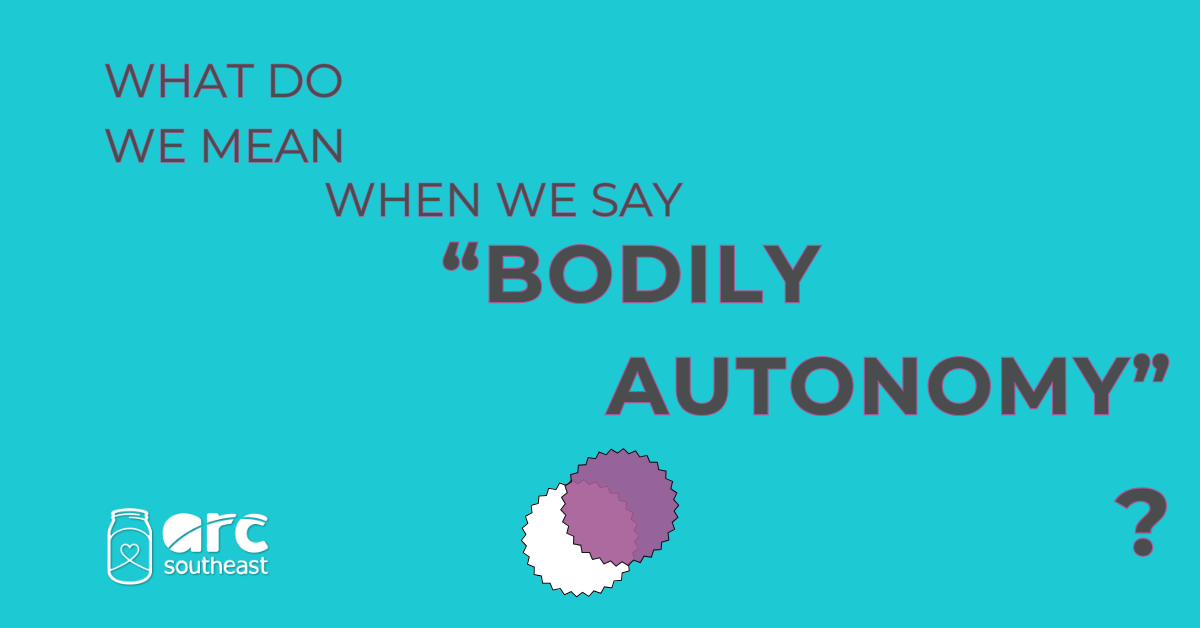What Does ‘Bodily Autonomy’ Mean? How is it Related to Reproductive Justice?
[Trigger/Content Warning: This article mentions rape, forced sterilization, and other instances of reproductive/sexual violence]
Bodily autonomy is a foundational principle of reproductive justice. Bodily Autonomy refers to each person’s right to make decisions about their own body, without coercion or limits imposed by outside forces, such as armed agencies or medical professionals. Bodily autonomy is essential for achieving justice and freedom; it is the freedom to choose if, when, and how to have children, and is a fundamental human right.
What exactly does bodily autonomy encompass? It’s the right to fully informed and consensual decision-making:
- Having full access to the information, options, and resources needed to make informed choices about reproductive healthcare, because we know that full consent to care cannot be given without having all the facts. This includes (but is not limited to!) options for contraception, abortion care, pregnancy care, childbirth options, childcare, emergency contraception, gender affirming care and fertility treatments.
- The ability to decide what happens to your body and when, including no physical contact without consent, no invasive medical procedures without consent, no interactions with armed agents of the state (like police!), and safe and empowered intra-communal interactions.
- Being able to parent children in safe, healthy communities with affordable housing, living wages, quality schools, and healthcare, without threats to their bodily autonomy. This one is crucial, because it means we must work to fundamentally change the society we live in to better cater toward our children, our families, and our livelihoods!
Bodily autonomy has long been denied to marginalized and colonized groups in the United States, across a spectrum of experiences. Black, Indigenous, Latinx, and other historically oppressed communities have faced horrendous violations of consent, dignity, and reproductive freedom throughout history due to chattel slavery, colonization, and capitalism. Denials of bodily autonomy that we see today, such as abortion bans, are results of the legacies and consequences of this history.
Some examples include:
- During slavery, enslaved African women were forced to endure rape by slave owners, forced breeding with other enslaved people, and forced birth to produce more enslaved Africans. Their children could also be sold away from them at any time.
- In North Carolina, at least 7,600 Black women were sterilized between 1929 and 1974; during the twentieth century, thousands of Black women were coerced into involuntary sterilizations.
- Over a six-year period in the 1970s, physicians sterilized at least 25% of Native American women of childbearing age as a result of the Family Planning Services and Population Research Act of 1970; there is evidence suggesting that the numbers were actually even higher.
- Puerto Rican women were used as “practice” for medical students learning to insert IUDs in 1956 clinical trials. These trials, sponsored by a pharmaceutical company and U.S. policymakers, led to the island having one of the highest rates of sterilization and IUD use globally by the 1960s.
- In Occupied Palestine, several pregnant Palestinians a year are forced to give birth outside of medical facilities due to the extensive network of Israeli checkpoints and barriers in the West Bank, risking the health of both mother and child. These checkpoints are typically crowded and violently policed cages, and pregnant Palestinians must navigate through multiple to reach medical facilities, leading to delays in reaching essential prenatal and emergency care.
Forced sterilization, lack of pain relief during gynecological procedures, and disregard for cultural preferences during childbirth are just some examples. Low-income women also face barriers to accessing reproductive healthcare and unjust scrutiny of parenting decisions, especially across the U.S. South.
The anti-abortion movement’s goals reveal a complete disdain for the entire concept of ‘bodily autonomy’, particularly for those already marginalized. Banning abortion does not stop abortion— it only exacerbates barriers for marginalized people. True reproductive justice will only occur when all people have autonomy in making intimate personal decisions about their healthcare without risking their lives, health, families, or freedom.
Securing reproductive justice at a structural level requires dismantling white supremacy and gender oppression in healthcare and society. That’s a big task that will take lots of community organizing and dedication. However, there are many practical actions you can take and and discussions you can bring up now that help! Some practical ways that community organizers, organizations, workplaces, and others can support bodily autonomy of community members includes:
- Community-based interventions, including political education, community mutual aid, and peer-to-peer support groups such as ARC-Southeast’s Sow.Now.What support group. These are critical to building networks, neighborhoods, and communities that are cared for and able to thrive, while also building a base of community.
- Providing comprehensive and inclusive sex education, free contraceptive access, and protection for pregnant and parenting students.
- Workplace accommodations, protections, and resources for workers’ pregnancy, menstruation, and abortion.
- Donating, volunteering, and amplifying existing community empowerment and organizing programs like Plan B: Southeast that help provide access to vital reproductive necessities.
Join us in advocating and organizing for bodily autonomy! If you believe in the human right of every individual to make decisions about their own body, you can play a vital role in this movement. Support organizations and abortion funds like ours, which are committed to helping people access safe and legal abortion services. Your contributions empower us to continue this crucial work, ensuring that everyone has the freedom to make personal healthcare decisions, regardless of their class, race, area code, or any other factor!
Together, we can uphold the dignity of choice and keep the power of directing our own lives within reach. Consider making a donation today to join this vital cause and help us make a difference.
